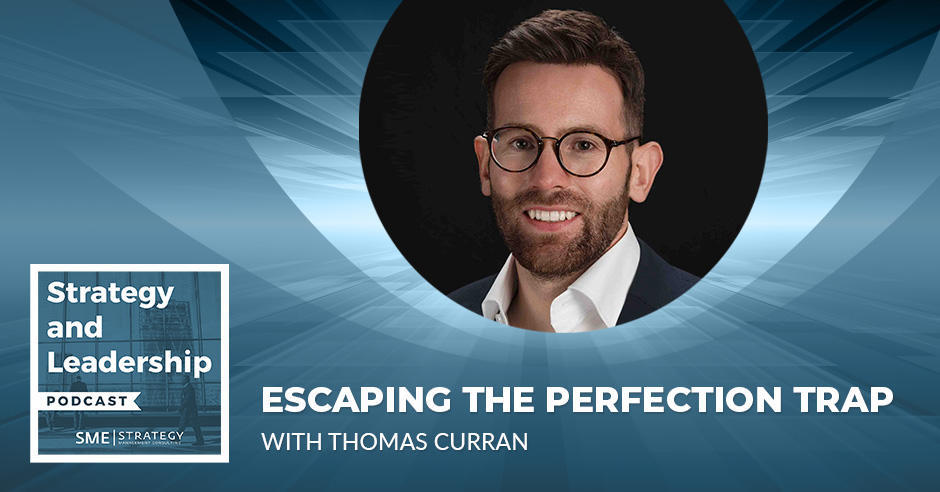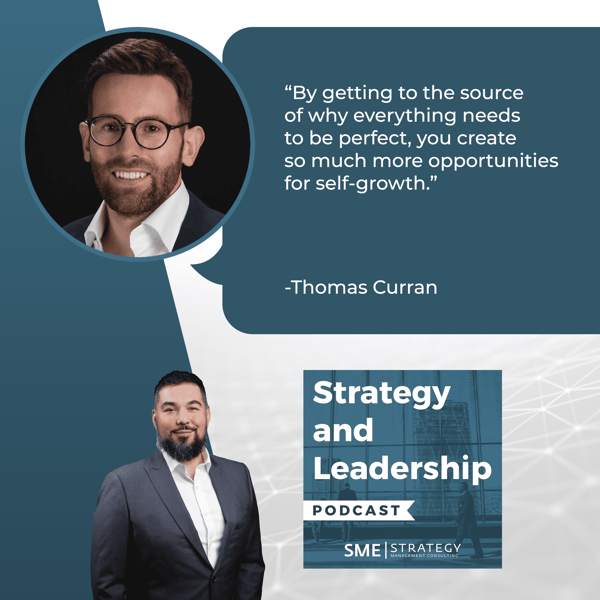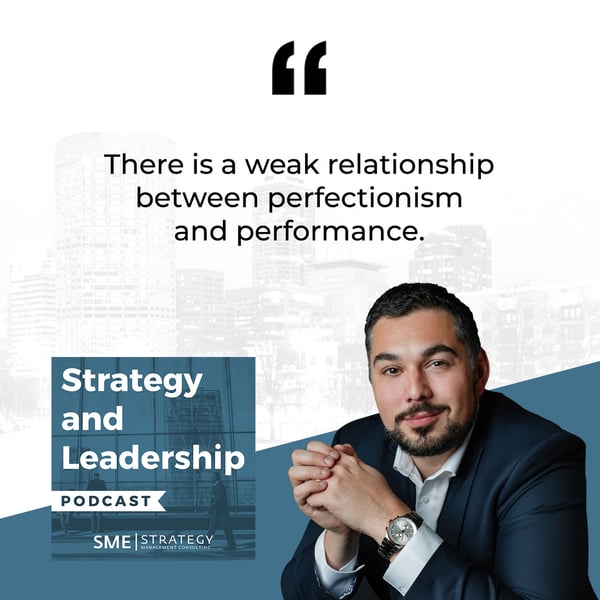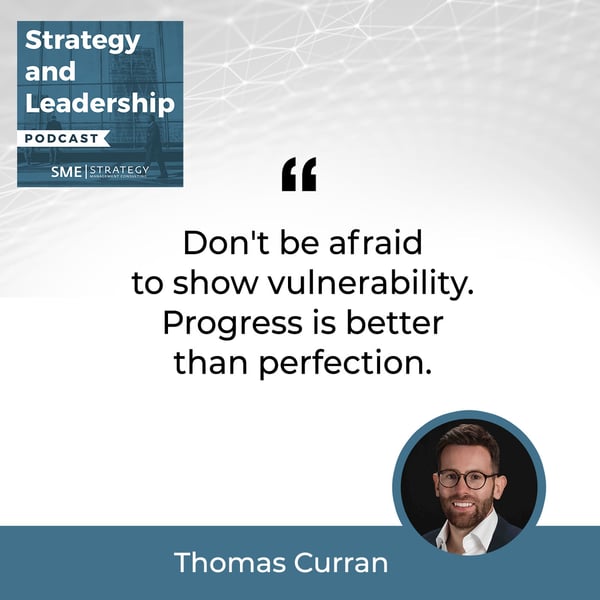
In a world driven by intense competition, it can be so easy to lose ourselves in that pursuit of perfection. And when it becomes a dangerous obsession, it will cost you more than you know and even notice. In this episode, Thomas Curran, the world’s foremost expert on perfectionism, takes us deep into his book, The Perfection Trap, which looks at the dangers of obsessively going after perfection and how we can escape that trap in today’s competitive environment. He shows what we can do to resist modern-day pressures to be perfect and explains why good enough is often a better aspiration. So, get off of that ever-moving hamster wheel of perfection and focus on what matters most.
Listen on Spotify: https://open.spotify.com/episode/2PwHVK2mm9d61SeLqPT4a0?si=ec8f19452e164124
Listen on Apple Podcasts: https://podcasts.apple.com/ca/podcast/escaping-the-perfection-trap-with-thomas-curran/id1202449526?i=1000631993930
---
Watch the episode here
Listen to the podcast here
Escaping The Perfection Trap With Thomas Curran
My guest is Thomas Curran. He is the author of The Perfection Trap. He is also an Associate Professor of Psychological and Behavioral Science Research Methods and Statistics at the London School of Economics and Political Science. Thomas, how are you?
Thank you for that.
I'm so grateful that we got to chat. When I learned about The Perfection Trap, I thought it was something applicable to so many people who want to do things but before we get into the book and your body of work, why don't you tell our audiences a little bit about you, and then we will get into some questions?
I am an academic, which means I teach students about the wonderful world of psychological and behavioral science. I teach them statistics too. It's always a joy but not necessarily the subject that students necessarily go to study psychology and learn about. Nevertheless, it's interesting. Here's a little bit of background. I come from a small town and worked my way up the hard way to get where I am, which has a lot of challenges along the way but you say yes to every opportunity that comes, and sometimes you end up doing great things. Here I am. I love doing the book. It was great to write it. I'm enjoying talking to people about perfectionism and hopefully revealing a little bit more about this curious trait.
What's interesting is you mentioned in your intro, "I did a lot of stuff. I had to do it the hard way. It didn't work out as I wanted to." You combine that with your studies of psychology and how the human brain works and then ultimately you write the book on perfectionism and when good enough is good enough. Maybe you can tell our audiences a little bit about the premise of the book, and then I'll ask how it can apply to everybody's natural life.

The premise of the book comes from my experience. I've considered myself to be a perfectionistic person. That's one of the reasons that I've been able to reach the stage in life that I have in terms of my professional successes but it doesn't mean that it's come without a cost. A lot of that cost came in a lot of psychological difficulties, pushing myself too hard, and sacrificing areas of my life. I regret sacrificing time with friends, family, community, and all the rest of it, which was sacrificed to work.
Research is me searching for this respect. I succumbed in my late twenties to perfectionism. I had what I would consider to be a breakdown. I needed help at that point, and I was brought to the awareness that perfectionism was far from helping me. What I thought was this very intense drive that was taking me forward was amplifying a lot of the stress and strains I was feeling in my life. It was making it more difficult to rest and recover. Ultimately, it was creating psychological problems that I was trying to resolve with perfectionism. It's a curious trait in that respect.
We think it's doing us good but it can do us a lot of harm. That was the impetus to work in this area. There wasn't much done on it. I've done a lot of research now and over time, looked into what perfection is, what it does to us, and importantly, what's going on out there and what is it that lots of people feel like they need to work, hustle, grind, and reach for the perfectionistic standards all the time. The work I've been doing is showing that a lot more people are a lot more perfectionistic in years. That's something that we need to talk about.
What does the research say about perfectionism? What does the research say about folks who are dealing with perfectionism? I'll ask you about how to address it.
Perfectionism is a form of deficit thinking. This is the first thing audiences need to grasp because it differentiates perfectionism. We think perfection is conscientious and particular, "All these things are amazing ways to strive from a very healthy, active, and optimistic place of wanting to do more, wanting to improve, and wanting to get better." Perfectionism isn't that. Perfectionism comes from a very darker place in the sense that at root, I don't feel enough. I feel like I'm imperfect and that I have shortcomings and flaws. If those shortcomings or flaws are revealed to the world, then everyone is watching. They're waiting to pounce and let me know.
Perfectionism is a form of deficit thinking. It comes from a very darker place in the sense that at the root, you don't feel enough.
It looks like high striving on the surface but it's a cloak. It's a defensive mechanism to try and conceal those inner imperfections that we're deeply ashamed of. If you can start there with perfectionism, you can begin to unpack some of its more negative aspects. That deficit thinking leads to a lot of self-criticism and self-loathing when we haven't done things quite as well as we should have.
It also creates quite rigid, obsessive, and unsustainable forms of striving that mean that we put ourselves through the wringer a lot of the time because we feel like we have to keep going. We have to keep moving forward. We cannot stop because if we stop, then we show some chink or vulnerability. We show that we're willing to slow down and perhaps settle for less than perfection. All these things are important aspects of a perfectionistic person's self-esteem. That's the crux of it. That's why it's so problematic. The literature tells us that there's a very strong relationship between perfectionism and mental health outcomes, anxiety, depression, self-presentational concerns, and all the rest of it.
Thank you for that. One of the reasons that I wanted to have this conversation is because if you look at organizations, they consist of people, and people have lives outside of work. It's not just the work that they do. It's their family life. The reason I wanted you as the audience to be able to experience this is to consider for yourself, "Is there something that might apply to me? Is there a way to address it if I so choose?"
The flip side of that or the parallel is what you mentioned. When you're starting, you're saying, "I have been able to accomplish so much because of my perfectionism." I can hear my internal self. I'm a C student, not an A student. I have given up perfection. I won't go there but I could hear the inner dialogue of high performers saying, "I like my perfectionism. It has gotten me to the point where I have." Building or reflecting on what you said, it's saying, "There's a cost to perfectionism." Outside of your experience, what is the cost of that perfectionism so that our audience can consider whether they want to continue that path or not?
Here's the thing. I hear this a lot. You're on the money here. Whenever I talk about perfection and the danger of perfection, I get this a lot, "I'm a perfectionistic person, and perfectionism is what's got me to the top." I would say to those people that perfectionism is part of your psychology but it won't have been what's got you to the top. What's got you to the top is things outside of perfectionism that are as important but your perfectionism per se has probably given you no more likelihood to succeed. We know that from the data. It has a very weak relationship with perfectionism.
There is a weak relationship between perfectionism and performance.

There's a very weak to non-existent relationship. You probably got to the top not because of your perfectionism if we're going on the data alone. Here's the reason we hold perfectionism so close and dear and we truly sincerely believe that it was perfectionism that propelled us to the top when perhaps there were other factors that were just as important, if not more important like social circumstances, being in the right place at the right time, meeting the right people at the right time, and all of these very circumstantial factors that are as important when it comes to understanding why people are successful above and beyond work and perfection.
These things are important. I'm not saying they're not but they are also a bigger picture to success that we need to consider. It isn't just the work and perfectionism that led to those outcomes. There are other important things. That's important because it speaks to something that I see all the time out there in the wider culture. All we do is platform the winners, the successful, the CEOs, the Fortune 500 leaders, the elite athletes, the actors, the musicians, and people who have made it through some competitive selection process to get to the top. We ask them, "How did you get there?" They will say, "Perfectionism."
What we are not seeing is what's going on underneath that elite, and what's going on underneath that elite is millions of people who are doing the same things but without the Grammy, Fortune 500 companies, or the Oscars to show for it. This is classic survivor bias. This is why we think perfectionism is the root secret to success but it's only because we are only ever talking to the winners. If we talk to the people who didn't quite make it, they would tell us a very different story.
They would tell us that they tried and strove incredible discomfort and didn't quite get over the line for reasons that perhaps are out of their control, circumstances, luck, happenstance, or being in the right place at the right time. It didn't quite work out on that occasion. We need to be careful about that selection effect. I hear this all the time. If you look at the data, there's no relationship between perfectionism and performance. I can talk about why that is but what you said there is critical because I hear this a lot.
It's interesting to see what you attribute success to because it could be persistence over perfection and a bunch of other things. Here's an interesting experience that we have in our lives. My wife and I have a soon-to-be fifteen-month-old child. My wife is somebody who aims to be perfect. In my eyes, she's perfect as long as you send this episode to her. She struggled with it and then realized that as much planning as you want to do with an infant child, the baby is going to do what the hell they want, and it's going to turn out how it turns out. Despite your best intentions, it gives you the space to realize that perfection isn't a thing because it's more adaption that supports that. I thought of that now. Are there any thoughts between adaption and perfection?
Having a child is probably the biggest sledgehammer you can take to perfectionism because you soon realize in very short order that you are reduced to nothing more than a helpless spectator in their show. This is that need for control or that need to try and perfect everything all around us. Sometimes there are situations where that simply isn't going to work. It is not possible, and that's okay. It's not just in the context of parenting. It's in the context of broader life. Heartbreak, grief, and health scares will come along in your life all the time. A global pandemic is going to come along and screw that business plan that you were so close to putting out there. You can't do anything about it.
That's fate. It's important to remember that fate is nothing personal. Sometimes crap happens, and there's nothing you can do about that. Perfectionists struggle to deal with that concept because everything around them has to be controlled and perfected. If you can let that go or accept that sometimes life is going to happen to you, and that's okay, then honestly, that's the best way to push through perfectionism. Having a child is one of the best ways you can do that.
Are you looking for a strategic planning facilitator or strategic planning services? Contact us today for a consultation.
We study a lot of organizational behavior and people's behavior in the work that we do, and I study a lot of personal psychology. I'm not a psychologist. You might not have an answer. In your research, how much does lack of control during the formative years of 8, 11, and 13 and a significant incidence that was ingrained in the wiring of the brain impact a person's future desire for control?
I'll speak for myself. I had an experience when I was younger where I didn't have control over my money in a certain situation. I wanted to buy a thing. I wasn't able to buy it, or I wasn't given permission to spend the money on it. Therefore, I now need to control my money, and that's why I'm an entrepreneur and do the things I have to do. Have you found a correlation between a formative lack of control or out-of-control feeling and a desire to try to control everything?
It's such a close relationship. Those formative years are so important. We live in a very consumerist society. If you've got the means to afford the idealized standard of life that beams back at us from TV screens, billboards, and social media, then you're going to be all right but most of us don't. I grew up poor. I didn't have a great deal. Every time I saw my friends with the latest trainers or the newest phones and gadgets, and then when we got a bit older, the newest cars and the rest of it, I was ashamed. It's so stupid. It's only stuff but I felt so embarrassed because if you don't have those things, there must be something wrong with you. That carried through me.
The overcompensation in later life to try to make up for those feelings of lack was part of the perfectionist treadmill that I started to get myself entrenched on because it's exactly as you said. If you don't have control at that moment or if you simply can't attain it, then there's that angst, tension, worry, or inner conflict that you feel between this person you are and the person you want to be. That is what we call the differential. When you suddenly get into later life, and you are able to enact a little bit more control, you are going to go on overdrive because you didn't have these things in the formative years. There's a very close relationship between those things for sure.
Let's say that our audience is saying, "Maybe I don't want the side effects of perfectionism. Maybe I want to be able to release some of that stress and let go of some of the expectations I have on myself because they don't necessarily serve me any longer." Let's take that case. What are some things that people can do to recognize or help them recognize that good enough is good enough?
The best thing to do is to experiment in your mind. You listen to successful individuals. They're very business-minded, and I'm sure we will be developing businesses and taking risks in an entrepreneurial way. This is a process that requires a hell of a lot of perseverance but it also requires a lot of failure, tinkering, and iteration. It's important to recognize that there is no perfect business just as there are no perfect presentations. There's no perfect research paper.
There are hundreds of good enough businesses, papers, and presentations, each of which will lead to the same outcomes but in slightly different ways. It's important to recognize that's the goal. That's the aim. That's the outcome or should be the outcome of what we're trying to do. We're trying to create something good enough, that appeals to the people that we're trying to appeal to, that draws a profit, that grows, and all the rest of it. All of those things don't have one perfect pathway. They have many different good enough pathways.
There are hundreds of good enough businesses, papers, and presentations, each of which will lead to the same outcomes but in slightly different ways. It's important to recognize that's the goal.
That's useful because that helps us let go of the idea when we're comfortable that it's good enough, rather than waiting, iterating, and trying to change it, improve it, and get it better, and then it's never going out at all. This idea that progress is way better than perfection is a cliché but it's so important. In our lives, we also need to challenge our perfectionism in important ways too just as it's important to get stuff out there except when things are good enough and let it go.
We also have to reflect on that process because often we will catastrophize the outcome of giving something up, which is why we are reluctant to give it up in the first place. Test those ideas. Put something out there. Even if you don't think it's quite there yet, put it out there. See what happens. What's the reception? Is it as catastrophic as you think it is even if it doesn't go well?
Let's say it flops. What's the outcome? How does that feel? Has it been this ultimate catastrophe that you in your mind's eye played up to be? No. You learn a great deal about yourself in those moments because that perfect business or that perfect person that you're trying to put out into the world is not worth living in fear for. Things will go wrong. You're going to fail way more than you're going to succeed, and it's fine. Keep moving forward. Keep developing. What can you learn? Put things out there. Don't be afraid to show vulnerability. Progress is better than perfection. That is the most important thing to bear in mind when you're trying to break through your imperfection.

What I take away is there's a possibility that something you do not do perfectly does turn out into a catastrophe. We don't want to say that there's no way that's going to happen but the likelihood of it being as bad in your brain in its truest form is unlikely. You will realize there's an opportunity cost to it. As I alluded to, I was a C student. I always approached it that there's an opportunity cost for me to get from a C to a B to an A. I thought that way in high school. I said, "I would rather use that extra time." It gets tighter. It's more expensive as you get closer to the top. I said, "I would rather put that time somewhere else to be a generalist."
Here's an example for me. I launched a course several years ago and said, "It's going to be ugly but effective. It's not going to be pretty but it's going to be good enough, and then I can iterate." The idea of iteration is a strong one. As we finish up here, do you ever talk about the idea of Minimum Effective Dose? It's how I think about that in the brain. You can boil water at 100 Celsius. It doesn't matter if you get it to 110 or 120 because 100 is the baseline. It's 100 in Canada and probably the UK, maybe not in the US. I'm sorry if everybody is like, "100 Fahrenheit. What the heck?"
Perfectionists are inefficient overstrivers. They will put in way more effort than most people to attain the same outcomes because they can't help themselves. This is true. Working smarter and not harder is so important. It's recognizing, "What is the minimum threshold for me to get this task done out there and complete it onto the next thing?" being happy with that, accepting that, and holding yourself to that, not going, "We're here. I want a bit better." Get it out. Get it going because you have to move quickly in this economy. You can't stand still for too long. Getting stuff done, finding the comfort level of what's acceptable, and then holding yourself to that is so important. Find that minimum threshold. Stick to it. Let it go. Move on to the next thing. Keep moving. That's the most important.
Thomas, thank you for the time. Where can people learn more about you? Where can they connect with you? Where can they get your book?
Thank you, Anthony. If you type into Google, Thomas Curran's The Perfection Trap, you will find all the information about me and the book. I would encourage your audiences if you do grab a copy to please get in touch because I would love to hear from readers.
Thank you, Thomas. It has been such a pleasure to meet you, Thomas Curran, the author of The Perfection Trap: Embracing the Power of Good Enough. One of the things I learned is how it's rooted in what you do and how as an individual within an organization, it can hold you back. It's always a choice because you do get something from it. Otherwise, you wouldn't do it.
My challenge to you, the audience, is what are you sacrificing? Which one is paying the greater cost? You might find a breakthrough in yourself. You might find a lot more freedom, recognizing that you could put that time, energy, and focus somewhere else and get good results because you've been doing it this entire time. Thomas, thank you for the time. I appreciate you being here. Folks, I appreciate your reading. We will see you next time. Thank you, again, everyone.
Important Links
About Thomas Curran



